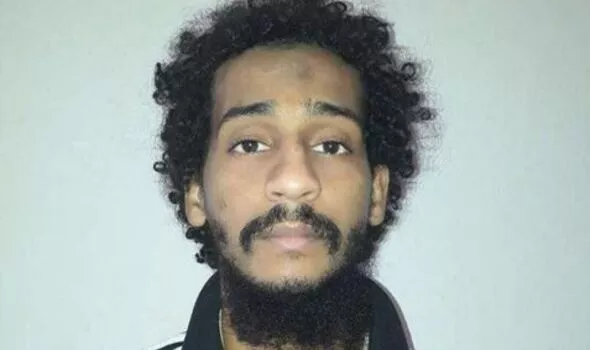
As a young boy, El Shafee Elsheikh dreamed of playing football for Queens Park Rangers.
Refugees from the civil war in Sudan, he and his family had settled near QPR’s west London ground when he was five.
Footballers were soon replaced by gangsters as role models when he was drawn into a world of drugs and violence on the council estates where he grew up.
A sadistic bully, Elsheikh would be an easy target for the extremists who later lured him into Islamic State and the hero-worship of its blood-thirsty leader, Abu Bakr al-Bagdadhi.
The terrorist’s parents Rashid Elsheikh and Maha Elgizouli had escaped war-torn Sudan in 1993 and headed for Britain.
His father left when he was seven leaving his mother to bring up their three sons.
An unremarkable schoolboy, Elsheikh managed to enrol on a mechanical engineering course at Acton College, west London.
At one stage, he joined the army cadets and worked as a mechanic at garages and fun fairs.
A source said: “His mother hoped he would knuckle down and get the qualifications he needed to make a career out of engineering. But it was not to be.”
Elsheikh, who grew up in the same part of London as fellow Islamic State “Beatles” Mohammed Emwazi and Alexanda Kotey, was 19 when he got into a fight with a gang member and was stabbed several times.
His older brother Khalid swore revenge. The 20-year-old attacker was shot dead on Christmas Eve as he took presents from his car in Loftus Road – just a short distance from QPR’s stadium.
Khalid was cleared of murder at the Old Bailey in 2009 but was jailed for 10 years for possession of a firearm wit intent to endanger life.
Elsheikh was 21 when he married an Ethiopian woman he met in Canada while visiting family in Toronto.
But the authorities refused to allow her to settle in Britain with her husband – leaving Elsheikh seething with anger at the UK government.
Two years later, he met a man from Eritrea whose father Islamist propaganda, according to the Counter-Extremism Project.
Elsheikh’s mother reportedly warned the two men to stay away from her son.
But he was soon engrossed in recordings by a London-based Islamist preacher.
In just three weeks, he changed his behaviour. He stopped wearing Western-style clothes and adopted long robes to conform with the teachings of the extremist, says the CEP.
Elsheikh’s mother was so shocked by his sudden radicalisation, she traveled to Sudan to seek advice from family members.
He was supposed to pick her up from the airport when she flew back. Instead, she was met by younger son Mahmoud who told her he had gone to Syria.
Elsheikh first joined an Al Qaeda affiliate in the region before being recruited into Islamic State.
He went to fight for radical Islam but made his reputation as a torturer rather than a soldier.
According to the US Department of State, Elsheikh loved waterboarding, mock executions and crucifixions.
His younger brother Mahmoud later joined him in Syria and he was killed while fighting with Islamic State forces in Iraq in 2015.
Today a US court jailed Elsheikh for life.
David Haines’ brother Mike said: “Today’s judgement provides another victory for humanity over the hateful ideologies of extremism.
“While the verdict provides no consolation for David’s life, it sends a powerful message to those tempted to follow the same destructive path.
“I continue to stand by the words I delivered in April. The actions of these men caused untold damage to so many, not least my brother David, but I will not allow it consume me.”
“I offer Elsheikh my forgiveness, and I sincerely hope that he uses his time in incarceration to recognise the pain he has inflicted.”
“I will continue to dedicate my life to honouring my brother David through my anti-extremism charity Global Acts of Unity. Only through tolerance, compassion and understanding can we reject hatred that seeks to divide us.”
“Finally, thank you to the US and UK authorities. Justice is served once again, and my family and I can finally move closer to peace.”
Earlier this week, Scotland Yard revealed how survivors of the “Beatles” helped give detectives a “jigsaw” of vital clues.
Elsheikh and Kotey were also linked to an English Defence League counter-protest in central London in September 2011.
Commander Richard Smith, head of the Yard’s counter-terrorism command, said yesterday: “This is one of the most significant international terrorism cases ever brought to trial.
“These were some of the most barbaric terrorist acts ever seen, carried out with chilling callousness and brutality.”
He added: “This was a painstaking investigation, unprecedented in scale, carried out by skilled and determined officers which involved taking tiny fragments of information about these men – gathered from isolated events that occurred years earlier – and piecing them together to paint a compelling picture proving their involvement in terrorist crimes committed in Syria.
“Elsheikh and Kotey thought they were beyond the reach of the law, but they were wrong.”
